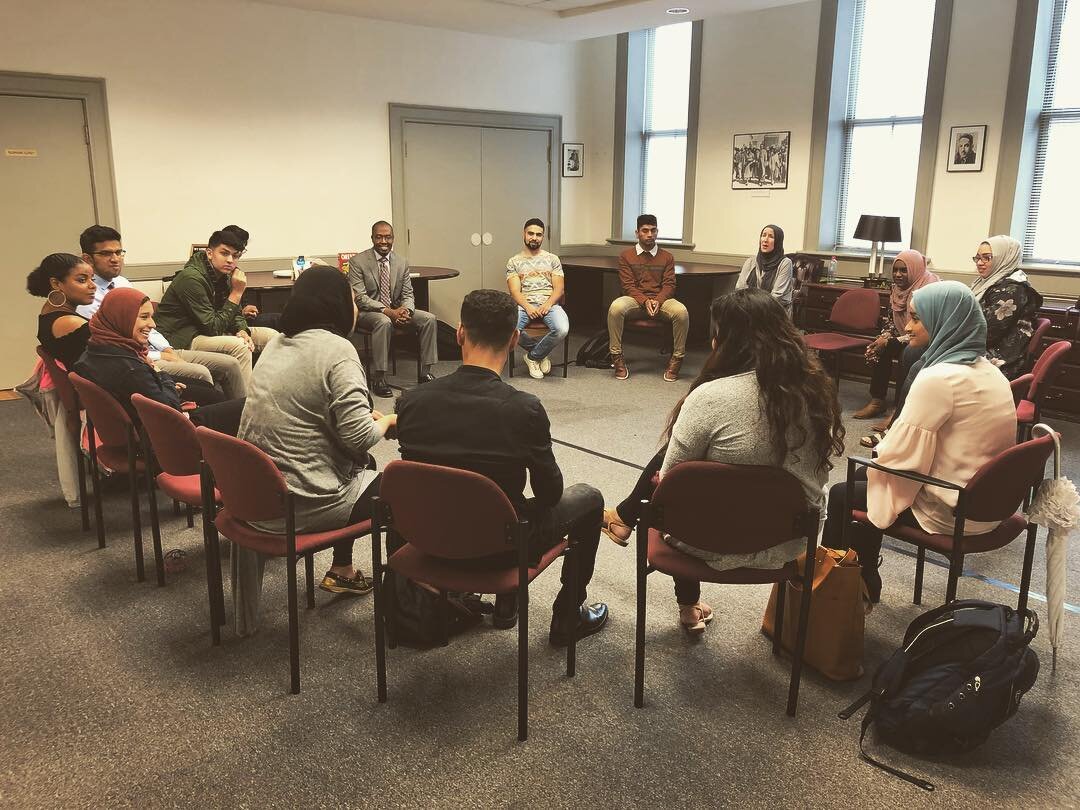
Community Chaplaincy
“Anyone who believes in Allah and the Last Day, should serve his neighbor generously ”
(Sahih Al-Bukhari, Volume 8, Excerpt from Number 48, Narrated by Abu Shuraih Al Adawi)
“Community chaplain” is a broad term that encompasses those who serve with public institutions such as police and fire departments as well as those who are affiliated with businesses, non-profits, protest movements, and masajid. Additionally, AMC recognizes those who have been professionally trained, but who may not currently be affiliated with a specific institution at this time. Community chaplains serve an important role bringing spiritual wellness into the lives of their neighbors and connecting people to resources.
Given the broad nature of this category, the responsibilities of Muslim community chaplains vary greatly. One thing that is consistent is that, while rooted in Islam, they provide spiritual care to all those seeking it within their organization regardless of their religious identity. While few Muslims serve in these roles currently in the United States, AMC is excited about seeing an increase in the years to come. Here we attempt to give a brief overview of some of the areas of service.
Requirements and Education
The requirements and education for community chaplains vary by the agency or organization that they are serving with. AMC strongly recommends that all community chaplains have a Master’s of Divinity and at least one unit of Clinical Pastoral Education and encourages them to seek endorsement. Community chaplains should never provide services at or through an organization without a contract in place and if operating as individuals they may want to seek liability coverage to ensure that they are protected.
Community Chaplaincy Settings
Police & Fire Department Chaplains
The primary role of chaplains within these agencies is to provide care for their colleagues and to serve those that the department serves such as victims of crime or those who have lost their home or loved ones to a fire. The setting of their work varies from riding along in patrol cars and on fire trucks, to sharing meals, visiting people in their offices, and presiding over funerals. Additionally Muslims serving in these roles act as bridges between the agencies and the larger Muslim community.
Disaster-Response Chaplains
There are several different routes that a person might become a disaster chaplain. The Federal Emergency Management Agency and their state equivalents employee Board Certified chaplains that provide care for their disaster relief and response staff. Additionally, Islamic Relief USA and the Islamic Circle of North America (ICNA) have partnered with the Disaster Interfaith Network to provide training for chaplains interested in deployed volunteering with their response efforts nationally. Chaplains serve an important role for those directly impacted by accompanying them as they begin their journey of meaning making and grieving, they also help to reduce secondary trauma for the response workers.
Masajid & Islamic Center Chaplains
This is an exciting realm of growth for chaplains in the United States where masajid often serve as central places of gathering for Muslims. Chaplains do not replace the Imam, but serve in a complimentary role providing pastoral counseling, education, and assistance representing the masjid in the local community. It is common for them to provide a similar compliment to Youth Directors. These chaplains may meet with people inside the masjid, but they may also visit members in their homes or during a hospital stay during times of birth, sickness and death.
Business & Non-Profit Chaplains
Some large businesses hire chaplains to serve the needs of their employees while some non-profits hire chaplains to provide for their clients as well as their staff. These chaplains may provide pastoral counseling, ethical guidance, and conflict mediation. Many professionally trained Muslim chaplains find that the skills of chaplaincy are an ideal fit for a variety of social service jobs – particularly those with Islamic organizations.

